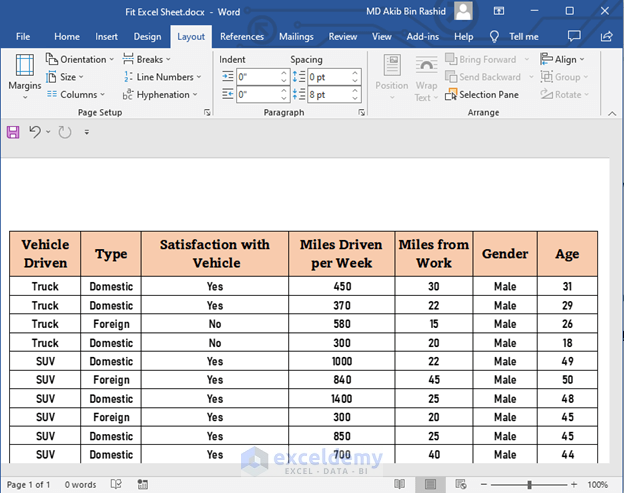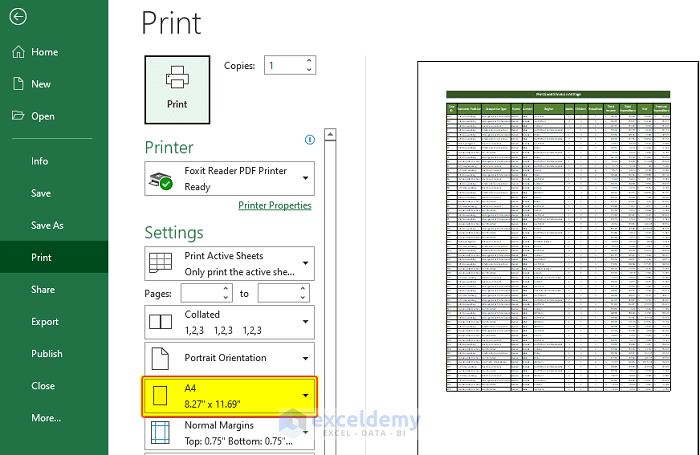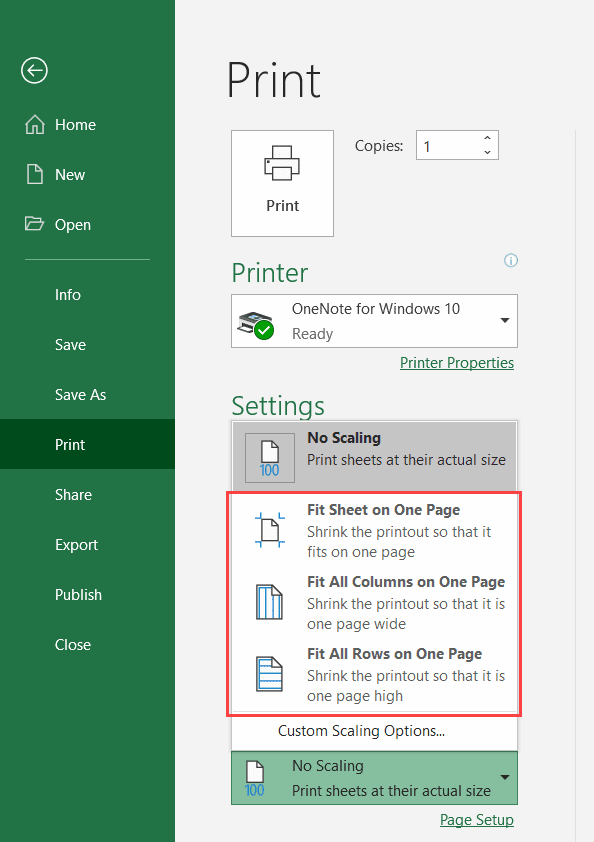5 Proven Ways to Print an Excel Sheet on One Page

Understanding Page Layout

Mastering the page layout settings in Microsoft Excel is the first step towards optimizing your document for printing. Here's how you can adjust these settings:
- Access Page Layout Tab: Navigate to the 'Page Layout' tab on the Excel ribbon.
- Page Orientation: Decide between portrait or landscape orientation, choosing the one that fits more data without distortion.
- Adjust Margins: Select 'Margins' from the 'Page Setup' group, and go for 'Narrow' or customize margins to fit more content.
- Change Scaling: Under 'Scale to Fit,' adjust the scale to fit your spreadsheet onto one page by altering the 'Width' and 'Height' settings.
🔍 Note: Scaling too much can compromise text readability. Balance between fitting data and legibility.
Modifying Print Area

Sometimes, you don't need to print the entire worksheet but just a specific range. Here's how to set a custom print area:
- Select the cells or range you want to print.
- Go to the 'Page Layout' tab.
- Click 'Print Area' and select 'Set Print Area'.
To modify or clear this area later:
- Adjust the print area using 'Page Layout > Print Area > Add to Print Area'.
- Clear it with 'Page Layout > Print Area > Clear Print Area'.
⚠️ Note: Regularly review the print preview to ensure your chosen area looks good on paper.
Adjusting Font and Formatting

To maximize the space on your printout, consider these formatting adjustments:
- Decrease Font Size: A slight reduction in font size can help fit more content. But, maintain readability.
- Use Condensed Fonts: Some fonts are naturally narrower, allowing for more text per line.
- Shrink Column Width: Auto-fit columns, then adjust widths manually to fit more data.
- Reduce Cell Padding: Minimize extra space around cell contents.
Here's a summary of effective formatting changes:
| Formatting Option | What to Do |
|---|---|
| Font Size | Reduce to 8-9 pts or as necessary |
| Font Type | Choose condensed fonts like Verdana |
| Column Width | Autofit and then manually adjust |

Using Print Preview

Before sending your spreadsheet to the printer, utilize the print preview feature:
- Go to 'File > Print' or press Ctrl+P to open Print Preview.
- Review the layout, looking for unnecessary white space or overflowing content.
- Make adjustments in the Page Setup dialog box for better fit.
Print Preview allows you to:
- View multiple pages at once to see how your data breaks across pages.
- Check if any key data is cut off or awkwardly split.
💡 Note: Regular print preview checks prevent unexpected print issues.
Hiding Unnecessary Columns or Rows

If your spreadsheet contains extra columns or rows that aren't essential for the printed version, consider hiding them:
- Select the columns or rows you want to hide.
- Right-click, and choose 'Hide'.
Hiding doesn't delete data; it simply removes it from view and print. To unhide later:
- Select the adjacent columns/rows, right-click, and choose 'Unhide'.
Wrapping Up: Adjusting page layout settings, setting print areas, formatting for space efficiency, using print preview, and hiding unnecessary elements are all effective strategies to ensure your Excel worksheet prints on one page. These methods balance data presentation with the need for concise printouts, making your document more professional and user-friendly. Remember, these techniques not only help in printing but also enhance the overall organization and readability of your Excel sheets, whether for personal use, presentations, or sharing with others.
Why does Excel not print on one page?

+
Excel defaults to fit the print area to one page width-wise. If your content doesn’t fit within this setting, it will span multiple pages. Adjust the page layout settings or font size to rectify this.
Can I change printer settings within Excel?

+
Yes, within the Page Setup dialog box, you can choose a different printer or modify print settings directly from Excel.
What if scaling down makes text too small to read?

+
Consider prioritizing essential information by hiding non-critical rows or columns, or reconsider the print layout design. Alternatively, print at a higher scale and manually trim to fit.



